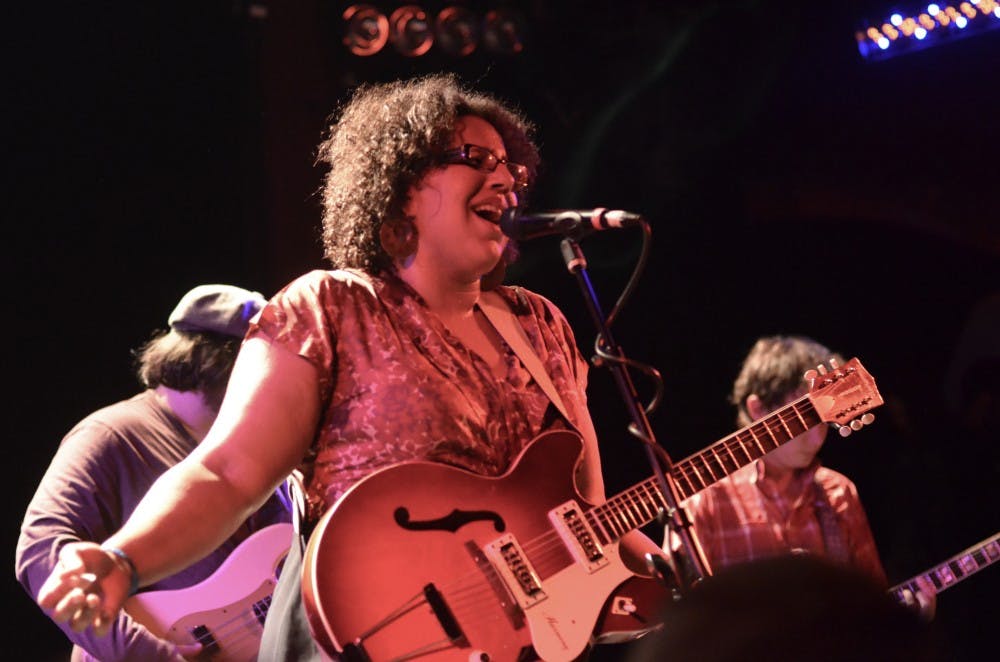The best way to describe Brittany Howard's debut album “Jaime” is restless. Whether this is because much of the album was recorded after a cross-country road trip, or because that’s just the Brittany Howard Way is up for debate. No matter what, it masterfully dissects identity and self-reflection as a means of artistic epiphany. “Jaime” feels almost invasive — as though by listening to the 11 songs straight through you are looking too close into Howard’s history, into a diary entry or personal family conversation. But that may be the purpose after all — your discomfort is not going to keep Howard from telling her stories and it never has.
Born in Alabama to a white mother and a black father, Howard is more than familiar with controversy, hatred, bigotry and the nature of discomfort. The album, dedicated to her sister who passed away from cancer at 13, was recorded after a cross-country road trip where Howard and her partner, Jesse Lasfer, were accosted and assaulted in Wyoming. As much as it is dedicated to her sister, who first taught her how to write a song, it is also for Howard herself. Part autobiography and part advice column, “Jaime” is an opus on growing up biracial in the deep south, being a queer woman in the music industry and what it means to be free. What does it mean to be free? According to Howard — being your most authentic self, no matter how many versions there may be of that self, or who might be watching.
While the whole album dissects growing up black in the deep South in one way or another, “Goat Head” is the ultimate call out. In a conversation with Apple Music, Howard described the three minute track.
“I did a few of these listening parties that artists do sometimes where they play their music, and every time it would come on, people would either laugh nervously or just gasp and cry,” she said. “And even for me, right after I sang it for the first time, I instantly felt so vulnerable and uncomfortable.”
What makes “Goat Head” so challenging is the upfront memories of the hatred that Howard’s family faced in Athens, Alabama. After the sing-song opening of “tomatoes are green / and cotton is white / my heroes are black / so why God got blue eyes?” Howard dives deep into the traumatic experiences, focusing on the specific moment when fellow Alabamians slashed her father’s tires and left a severed goat head in the back of his car. Even within a song that might feel overwhelmed with the horror of that memory, Howard still manages to go deeper into dissecting colorism as well with, “I guess I’m not ‘posed to mind ‘cause I’m brown, I’m not black / But who said that? / See, I’m black, I’m not white / But I’m that, nah, nah, I’m this, right? / I’m one drop of three-fifths, right?”
Another theme that slips through each track on “Jaime” revolves around who Howard is and how she lives in her day to day life. In almost every song you can find a moment where Howard says “I am” followed by some poetic, yet straightforward understanding of her own identity — “I am nonviolent / I am a master student ... I am dedicated,” she says in “13th Century Metal” — “I am waiting, I am waiting” she says in “Short and Sweet.” “I’m only as free as I remember … I’m not lovin’/ I’m returnin’...” she says in “Tomorrow.”
The comfort that comes from Howard’s self-assured mantras lends well to the restless nature of the album. If not for her confidence, the tracks would not seamlessly flow together, but her raspy, decided voice guides the ear. Otherwise the transition from “Short and Sweet” — a Nina Simone style ballad dedicated to the nervousness that comes with new love — to “13th Century Metal,” a song that is strictly improvised synth keyboard and Howard’s spoken word poetry, would feel jarring.
The end of the journey to understanding such a complex individual like Brittany Howard rests in the final track, “Run to Me.” The roughly three minute song — with sounds reminiscent of Prince and David Bowie — is Howard’s way of taking you by the hand, letting you know that finding yourself, understanding yourself even when the whole world is against who you are, means spending some time alone.
She finishes her masterful composition of identity with the words “If you’re feeling like a stranger / call out in the rain / know there’s a god in waiting / call out to me.”
Howard did not just give away insight into finding yourself, or her visions of human nature, despite the ease with which seems to write her songs. She poured her heart out in “Jaime” and you’d be a fool not to listen to the many facets and lessons of identity she has to offer.







